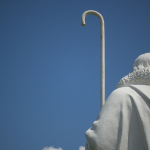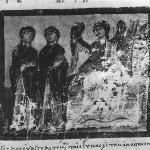In a comment Geocreationist left on an earlier post of mine about ‘literal days’, he helpfully points out that literal days do not, as a rule, have precisely 24 hours in them. Sunrise and sunset (the basis for reckoning days in the ancient world, including in Genesis 1, where it has “evening and morning”) vary over the course of the year. The idea of a “literal 24-hour day” depends on that relatively recent invention, the clock. So the next time someone tells you they believe Genesis meant “literal 24-hour days”, you should ask them “Which do you believe in, literal days or 24 hour days?”
Another comment from Jeff on the same post asked about the consequences for other Christian doctrines of accepting evolution. I have been wanting for a while to start working on a book on the “But what about…?” passages. Evolution is not, for many Christians, simply about the creation stories, but those stories in turn are intertwined with various other parts of the Bible.
If I can find the time to write the book, it will not simply focus on the ways in which the creation stories are symbolic and analyse human existence in general, rather than the specific experience of two human ancestors and them alone, although it will start with that. Not only is the story in Genesis 2-3 about a character named Human or Man (not ‘Adam’ as though that were his name) and his wife, but many things that are said make sense only if taken symbolically. For instance, if the point of husband and wife becoming one flesh was really a literal creation from the man’s rib, then this story would make all husbands and wives utterly unlike Adam and Eve, and thus undermine its own point.
In Romans 5, one of Paul’s key presuppositions (the comparison between Adam and Christ) comes to the surface explicitly (which it does rather infrequently). In making a comparison between Adam and Christ, clearly the point is not about two different ways of being genealogically related to individuals. If that were the point, not only Adam but also Christ becomes a problem. But if the relationship has to do with two different modes of existence, two different ways of being human, characterized by the behavior ascribed to each in the stories about them, then the point becomes clearer. To focus on being ‘genetically related to Adam’ is to miss the point, that this is about ‘typical human existence’ and an answer to humanity’s experience of alienation from God.
Evolutionary explanations of some of our instincts – to survive, to eat, to reproduce – fits nicely with the Rabbinic idea of human beings have two impulses, the good impulse and the evil impulse. It has been suggested (e.g. by W. D. Davies in his study of Paul and Rabbinic Judaism) that Paul’s idea of the ‘flesh’ or ‘sinful nature’ derives from this part of his Rabbinic heritage. The rabbis were quite clear that these instincts are only ‘evil’ inasmuch as they lead us into evil behavior when we give them free reign. They are, however, also necessary to our survival. What makes human beings unique is precisely our ability to reflect on our behavior, to question what we do on instinct, and in these ways to choose to disobey our ‘selfish genes’ in favor of other sorts of altruistic behavior.
There is a lot more that can be said, and I hope to (eventually). But hopefully for the time being this will provide some suggestions and avenues to explore for those who find the evidence for evolution persuasive, but wonder about this or that passage that might be affected. In my experience thus far, exploring these passages in light of evolution has left me feeling that, in the end, I’ve understood them better, since often the things I used to focus on seem to me, with hindsight, to have been tangential distractions from the main point of the passages in question.
















